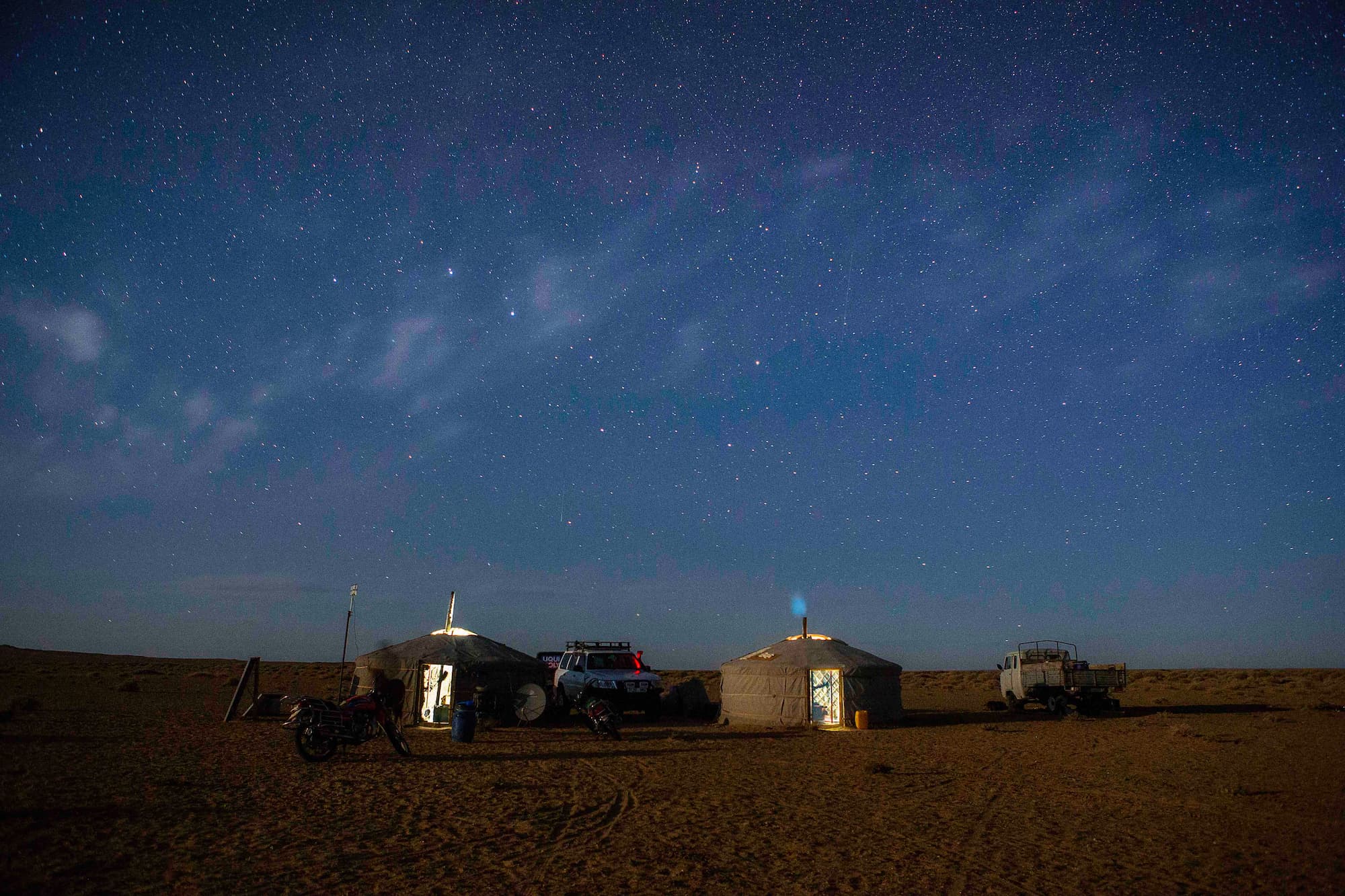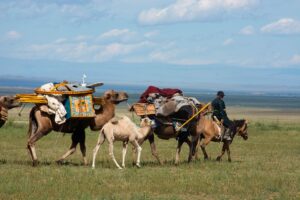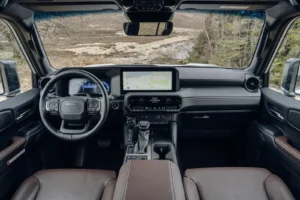If you’ve ever dreamed of endless horizons, ancient canyons, and the kind of silence that makes your heart race — a Gobi trip is calling your name.
The Mongolian Gobi Desert isn’t just a place you visit; it’s a place you feel.
It’s vast, wild, and endlessly surprising. From orange dunes that sing in the wind to rocky canyons hiding traces of dinosaurs, every day on a Gobi trip feels like stepping back in time or driving on another planet.
Here’s your complete guide to planning the ultimate Gobi trip, whether you’re chasing adventure, photography, solitude, or just the thrill of driving through one of the last untouched wildernesses on Earth.
1. Why the Gobi Trip Belongs on Every Adventurer’s Bucket List
The Gobi Desert stretches over 1.3 million square kilometres, crossing southern Mongolia into northern China. But what surprises most travellers is that the Gobi isn’t all sand.
It’s a mix of gravel plains, red cliffs, canyons, salt lakes, and mountains — a landscape that changes by the hour.
A Gobi trip offers the kind of freedom few places on Earth can match. You drive for hours without seeing another car. You camp beneath a sky exploding with stars.
You share milk tea with nomads in remote valleys. And at the end of each day, you realise this isn’t just a journey — it’s an experience that rewires your sense of space and silence.
For the independent traveller, there’s no better way to explore than by self-drive adventure. With a rugged 4×4 from gobi.rent, you can carve your own route through this wild land and discover places most tours never reach.
2. The Best Routes for Your Gobi Trip
There’s no single route through the Gobi. It depends on your time, your curiosity, and your comfort with off-road driving. Below are three of the most rewarding routes for a Gobi trip — from classic highlights to deep-desert adventures.
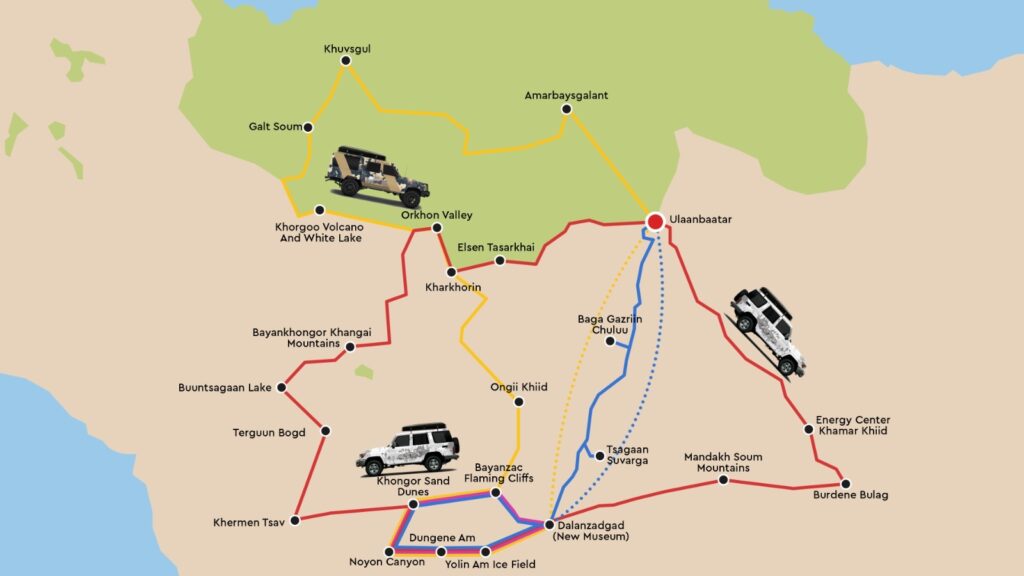
A. The Classic Gobi Circuit (6–8 Days)
Route: Ulaanbaatar → Dalanzadgad → Bayanzag → Khongor Sand Dunes → Yolyn Am → back north.
This route captures the essence of a Gobi trip — a mix of iconic desert sights and cultural encounters.
You’ll explore the Flaming Cliffs of Bayanzag, where dinosaur fossils were first discovered, ride camels along the massive dunes of Khongor, and hike through the icy gorge of Yolyn Am in the Gobi Gurvan Saikhan Mountains.
Highlights:
- The perfect blend of adventure, comfort, and accessibility.
- Local ger camps and traditional meals along the way.
- Plenty of gas stations and water points for a first-time self-driver.
B. The Extended Gobi Expedition (10–12 Days)
Route: Adds Tsagaan Suvarga, Khermen Tsav, Buuntsaagan Lake, and Ulaan Yavar (Gobi-Altai).
If you want your Gobi trip to go beyond the ordinary, take the long route into Mongolia’s southwest. This drive rewards you with isolation, surreal colours, and wild beauty.
Tsagaan Suvarga’s “White Stupa” cliffs glow at sunrise. Khermen Tsav (also called Kherson Tsav) opens into deep red canyons where you can wander for hours in silence.
Buuntsaagan Lake reflects the desert hills, a perfect camp spot for birdwatchers. And Ulaan Yavar in Gobi-Altai stuns with red sandstone formations that look almost Martian.
Highlights:
- Remote wilderness and endless off-road driving.
- Incredible photography and camping opportunities.
- Ideal for travellers seeking the “no-signal” side of Mongolia.
C. The Short Escape (3–4 Days)
Short on time? You can still enjoy a taste of the Gobi’s magic.
A quick Gobi trip from Ulaanbaatar to Tsagaan Suvarga, Dalanzadgad, and Bayanzag offers dramatic landscapes without long travel days. Perfect for weekend adventurers or those combining the Gobi with central Mongolia or the Orkhon Valley.
3. Top Highlights Not to Miss on Your Gobi Trip
Every traveller’s Gobi trip unfolds differently, but these are the must-see natural and cultural wonders that define the desert.
- Bayanzag (Flaming Cliffs): The fiery red cliffs glow like embers at sunset. This is where American explorer Roy Chapman Andrews discovered dinosaur fossils in the 1920s.
- Khongor Sand Dunes: Rising up to 300 metres, these dunes stretch for over 180 km. Climb to the top for sweeping views — or slide down to hear the famous “singing sands.”
- Yolyn Am Canyon: A narrow ice-filled gorge that stays cool even in summer. It’s a refreshing contrast to the desert heat.
- Tsagaan Suvarga: These white and pink limestone formations resemble the ruins of an ancient city. The colours change beautifully in the golden light.
- Khermen Tsav (Kherson Tsav): Known as Mongolia’s “Grand Canyon,” this deep red maze of canyons feels like another planet.
- Buuntsaagan Lake: A peaceful salt lake perfect for birdwatching and photography. You’ll often spot cranes, swans, and wild ducks.
- Energy Center (Khuld area): A spiritual site said to radiate powerful natural energy. Locals come here to meditate and recharge.
- Ulaan Yavar (Gobi-Altai): A surreal region of red cliffs and lunar landscapes, far off the tourist trail.
- Bagaa Gazriin Chuluu: A granite wonderland of caves, rock formations, and ancient petroglyphs.
- Ikh Gazriin Chuluu: Towering granite cliffs and sacred springs — a place where geology and spirituality meet.
Each destination adds a different layer to your Gobi trip: fossils and legends, endless dunes, sacred energy, and geological marvels.
4. Wildlife Watching on a Gobi Trip
It might surprise you, but a Gobi trip is also a journey through one of Asia’s richest desert ecosystems. The wildlife here is tough, elusive, and unforgettable.
Look for wild Bactrian camels — descendants of the original caravan animals — wandering in small herds across the dunes.
You might glimpse goitered gazelles, Mongolian wild asses (khulan), or argali sheep on rocky slopes. In the Gobi-Altai mountains, patient eyes may even catch a snow leopard or wolf moving at dusk. Around Buuntsaagan Lake, flocks of cranes, eagles, and migratory birds gather from May to September.
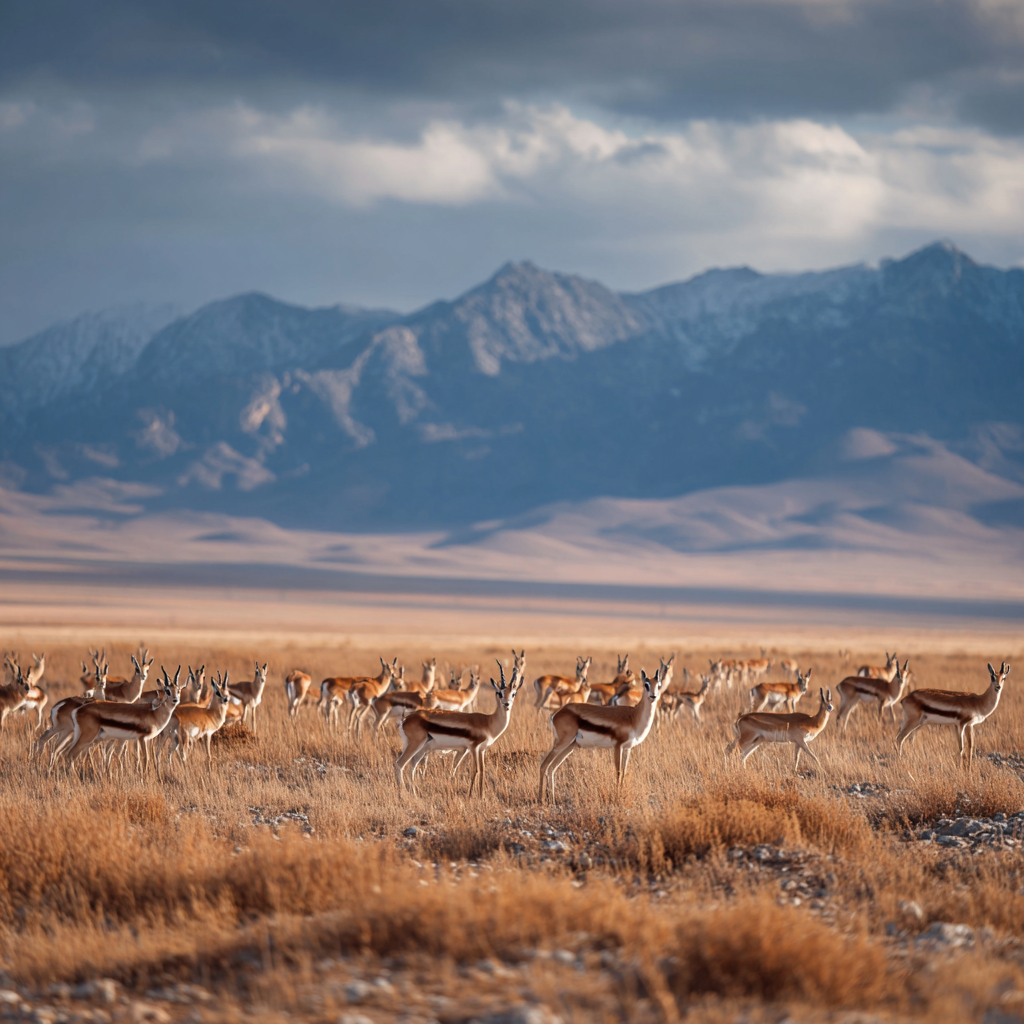
For photographers and nature lovers, a Gobi trip offers the chance to capture wild Mongolia in its purest form. Just remember to observe from a distance and leave no trace the desert’s silence depends on it.
5. Tips for a Smooth and Safe Gobi Trip
Driving through the Gobi isn’t difficult, but it requires respect and preparation. Here are key tips to keep your Gobi tripsafe, rewarding, and stress-free:
Best Time to Travel
May to September is ideal. June and July bring warm days and green steppe scenery; August to early September means fewer travellers and crisp air. Winter Gobi trips are possible but require heavy preparation.
Navigation & Fuel
Fuel up at every settlement — never assume the next station will have diesel. Carry extra jerrycans (20L or more). Download offline maps like Maps.me or OSMAnd, and always have a paper backup. GPS isn’t perfect here — part of the adventure of a Gobi trip is finding your own way.
Water & Food
Carry at least 10 litres of water per person per day. Many travelers also pack portable stoves, noodles, and snacks for flexibility. Local ger camps along main routes offer hearty meals and warm beds.
Vehicle Choice
Your 4×4 will be your lifeline in the Gobi. That’s why locals and professional guides trust the Toyota Land Cruiser 76and Toyota Land Cruiser 79 — two legendary models built for harsh Mongolian terrain.
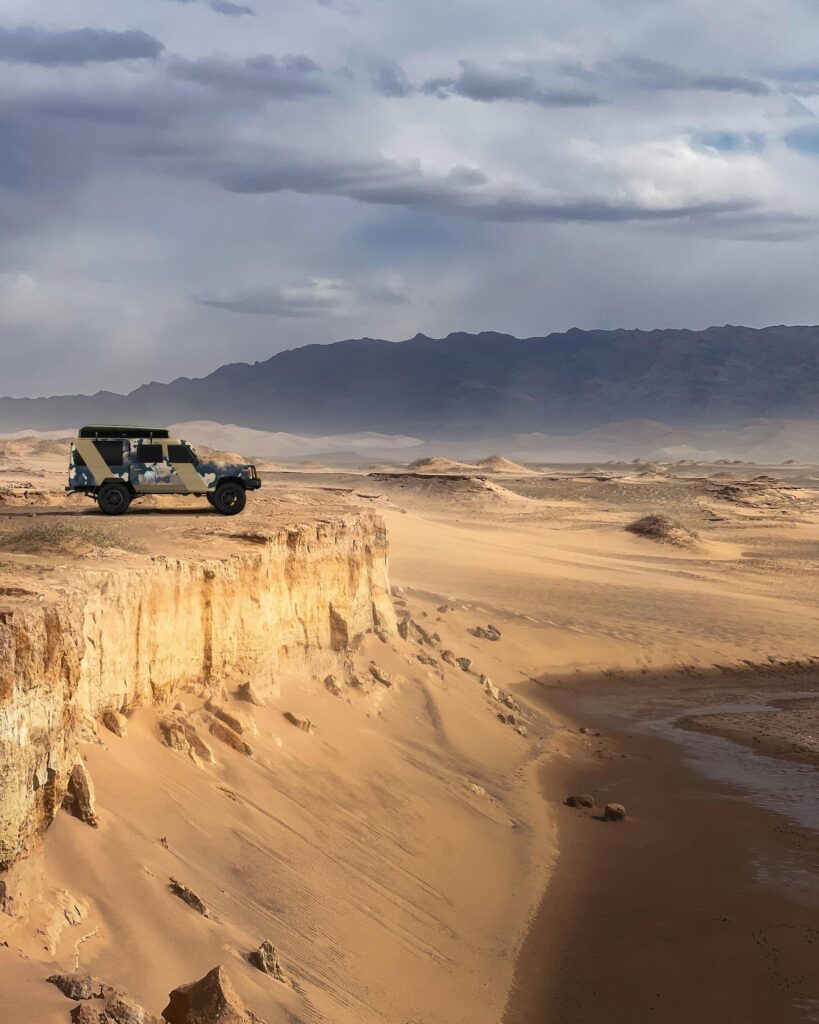
Renting locally through gobi.rent means your vehicle is desert-ready, equipped with spare tires, sand shovels, and the know-how of people who truly understand the Gobi.
A Toyota Land Cruiser gives you not just traction, but confidence. And in the Gobi, confidence is everything.
Communication & Safety
Mobile coverage disappears quickly outside towns. Consider renting a satellite phone or GPS tracker for long expeditions. Let someone know your planned route before you go — and check in whenever you can.
Respect for Nomads
Nomadic families are the soul of the Mongolian Gobi. Stop for tea, share stories, and ask before taking photos. If invited into a ger, it’s polite to accept at least a sip of tea or a bite of dried curd — it’s a gesture of friendship. Your Gobi trip will feel richer with these small connections.
6. Responsible Travel in the Gobi
A Gobi trip is a privilege. The desert’s fragile balance can be disturbed easily, so travel gently:
- Stay on existing tracks whenever possible.
- Don’t drive over plants or dunes.
- Pack out all waste — the desert doesn’t forgive litter.
- Support local communities by staying at family-run ger camps or buying handmade goods.
Every small choice helps preserve the beauty that makes the Gobi trip so magical.
7. Sample Itinerary for a Self-Drive Gobi Trip
Day 1: Pick up your Toyota Land Cruiser 76 or 79 from gobi.rent in Ulaanbaatar. Stock up on food, fuel, and water. Drive south to Dalanzadgad.
Day 2: Visit Yolyn Am Canyon and camp under the stars near the Gobi Gurvan Saikhan Mountains.
Day 3: Cross the dunes of Khongor and ride camels at sunset.
Day 4: Drive to Bayanzag (Flaming Cliffs) — explore fossil sites and enjoy sunset views.
Day 5-6: Continue west toward Khermen Tsav for a deeper off-road adventure.
Day 7-8: Relax by Buuntsaagan Lake and watch flamingos and cranes gather at dusk.
Day 9-10: Return north through Elsen Taserkhai mini Gobi — soak up the energy of this sacred granite landscape.
Day 11: Arrive back in Ulaanbaatar with a lifetime of memories.
That’s a Gobi trip done right — a balance of adventure, discovery, and silence.
8. What Makes gobi.rent the Best Partner for Your Gobi Trip
At Gobi.Rent, every vehicle is prepped by local off-road experts who know the desert’s challenges. You can expect:
- Toyota Land Cruiser 76 & 79 models in excellent condition
- Full desert gear: spare tires, compressor, tools, GPS
- 24/7 local support and route recommendations
- Flexible pick-up and drop-off options
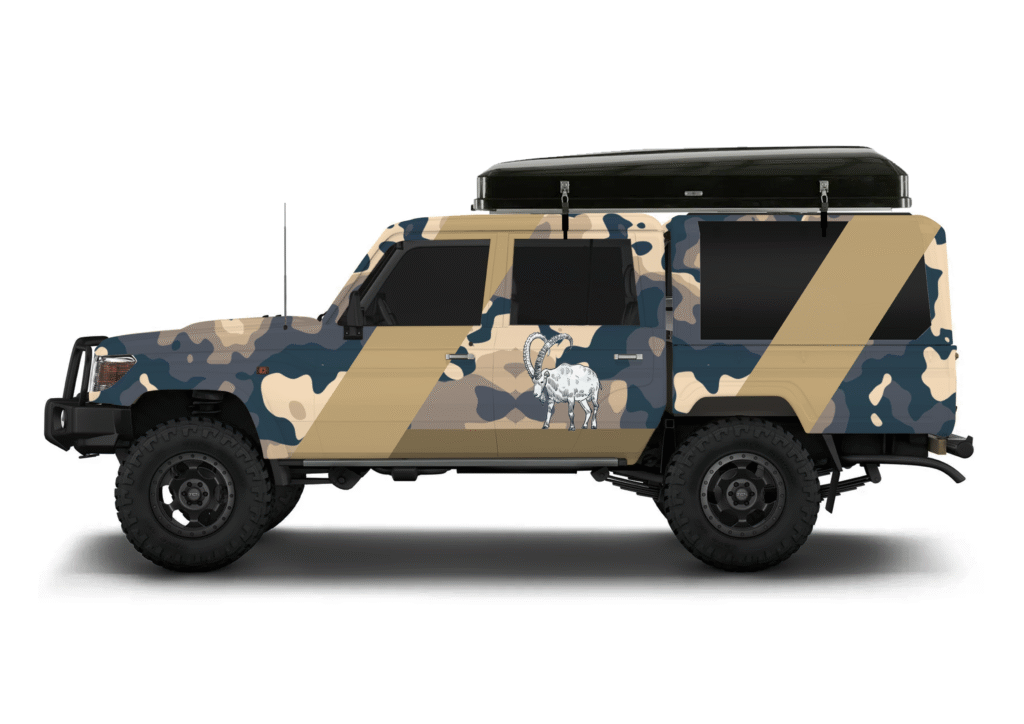
Unlike international agencies, Gobi.Rent was built for the Gobi — by people who drive it every season. Whether you’re on your first Gobi trip or your fifth, they’ll make sure your vehicle, route, and timing are perfectly matched to your adventure.
9. Final Thoughts – Begin Your Gobi Trip Today
A Gobi trip is not just another travel plan. It’s a test of freedom, resilience, and curiosity. It’s sunrise over silent dunes, long dirt tracks vanishing into nowhere, and the unfiltered beauty of Mongolia’s desert heart.
If the idea of open roads, starry skies, and true wilderness makes your pulse quicken, it’s time to start planning.
Check out www.gobi.rent to find your Toyota Land Cruiser 76 or 79, choose your route, and get expert local tips.
Your Gobi trip is waiting — and the desert never disappoints.
<strong>How to Plan a Gobi Trip</strong>
Choose Your Route
Decide how much time you have. A short Gobi trip (3–4 days) covers Bayanzag and Khongor Dunes, while a longer route (8–12 days) lets you explore hidden gems like Khermen Tsav, Buuntsaagan Lake, and Ikh Gazriin Chuluu.
👉 Tip: gobi.rent offers free sample routes with GPS maps and offline navigation files.
Pick the Right Vehicle
The Gobi demands reliability. Choose a Toyota Land Cruiser 76 or 79 — both designed for Mongolia’s rough desert terrain. Rent locally through gobi.rent to get desert-ready vehicles equipped with tools, spare tires, and local know-how.
Pack Smart
A successful Gobi trip depends on preparation. Pack light but essential:
10L water per person per day
Fuel jerrycans
Warm clothes for cold nights
Sunscreen, sunglasses, and hat
Offline maps and a paper backup
Respect the Desert and Locals
Drive only on existing tracks, take all waste with you, and always greet nomadic families respectfully. The Gobi’s peace and purity depend on responsible travellers.
Travel with Flexibility
The beauty of a self-drive Gobi trip is freedom. Plans change with the weather and the road. That’s part of the adventure — embrace it.
How many days do you need for a Gobi trip?
For a short overview, 3–4 days are enough to visit the main highlights near Dalanzadgad. For a deeper experience — including remote places like Khermen Tsav and Buuntsaagan Lake — plan 8–12 days.
What is the best time of year for a Gobi trip?
The best months are May to September. Spring offers mild temperatures and migrating wildlife, while late summer (August–September) has clear skies and beautiful sunsets. Avoid winter unless you’re fully equipped and experienced in cold-weather driving.
What vehicle is best for the Gobi Desert?
The Toyota Land Cruiser 76 and Toyota Land Cruiser 79 are the best choices for any Gobi trip. They’re powerful, durable, and easy to repair if needed. Rent through gobi.rent for vehicles already prepared for long desert expeditions.
Is it safe to do a self-drive Gobi trip?
Yes — as long as you’re prepared. Roads can be rough, but Mongolia is one of the safest countries for travellers. Always bring extra fuel and water, tell someone your route, and have a local contact number from gobi.rent for 24/7 assistance.
Do I need a guide for my Gobi trip?
Not necessarily. With a reliable vehicle, offline maps, and local route advice from gobi.rent, most travellers can navigate independently. However, hiring a local guide or driver can enrich your journey if you prefer to relax and focus on photography or culture.
Can I camp in the Gobi Desert?
Absolutely. Wild camping is one of the best parts of a Gobi trip. Just set up your tent away from herder camps, avoid driving on vegetation, and pack out all waste. Many also mix camping with overnight stays in family-run ger camps.
What kind of wildlife can I see on a Gobi trip?
Expect to see wild Bactrian camels, gazelles, argali sheep, and even snow leopards in remote areas. Around lakes like Buuntsaagan, you can spot flamingos, cranes, and eagles. Early mornings and evenings are the best times for wildlife watching.
How do I navigate during my Gobi trip?
Download offline navigation apps such as Maps.me or OSMAnd, and always carry a printed map. GPS can fail in remote valleys. The locals at Gobi.Rent provide preloaded navigation files for all major Gobi routes. Book a curated route with Gobi.Rent and you will receive a customized navigation app.
How much does a Gobi trip cost?
Costs vary by duration and comfort level. On average:
4×4 car rental (Toyota Land Cruiser with off road customization): $180–350/day
Fuel: $0.60–0.90 per litre
Ger camps: $30–250/night per person
Food: $10–20/day
For budget travellers, camping and cooking reduce costs significantly.
Can I connect a Gobi trip with other Mongolian destinations?
Yes — easily. Many travellers continue their route north toward Orkhon Valley, Khangai Mountains, or Karakorum. Others head west toward Altai Tavan Bogd National Park. With your Toyota Land Cruiser, Mongolia is wide open.
Ready to Begin Your Gobi Trip?
The Gobi Desert rewards those who dare to explore it on their own terms. Whether you want vast silence, desert wildlife, or the thrill of off-road adventure, your Gobi trip starts with one decision — to go.
Explore routes, 4×4 options, and travel inspiration at www.gobi.rent — your local expert for the ultimate self-drive Gobi experience.
